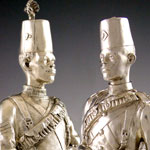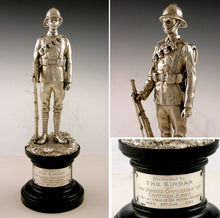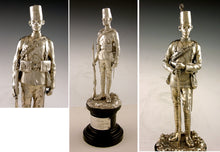The Anglo-Egyptian Sudan - Presented to General Wingate, Hallmarked London 1913
Adding product to your cart
Height overall: 34cm (13ins)
Three silver figures by the prestigious London silversmith Hunt & Roskell depicting types of the Egyptian Army, comprising a British O.R., an Egyptian Officer, and a Soudanese infantryman. Each mounted on a turned ebonised base applied with a silver presentation plaque inscribed, ‘Presented to The Sirdar by the British officers of the Egyptian Army, on the occasion of his silver wedding 1888 - 18th June - 1913’.
Sir Reginald Wingate, 1st Baronet, G.C.B., G.C.V.O., G.B.E., K.C.M.G., D.S.O., T.D. (1861-1953), was the fourth and penultimate Sirdar of the Egyptian Army (1900-1916).
Read more
Following the failure of the expedition to rescue General Gordon from the Khartoum in 1885, Lieutenant Reginald Wingate, a Gunner subaltern attached to the fledgling Anglo-Egyptian Army and a former aide-de-camp to its first commander-in-chief (or Sirdar), Sir Evelyn Wood, returned to England to ponder his professional future. While so doing he met his future wife, Catherine ‘Kitty’ Rundle, the sister of a fellow British officer in the Egyptian Army, but as neither had private means marriage had to wait until 1888, and Wingate returned to Cairo to forge the beginnings of his extraordinary career as master of the Anglo-Egyptian Sudan.
In early 1887 he was appointed to the Egyptian Army intelligence department in which he would make his name and by whose work the re-conquest of the Sudan was in large part facilitated during 1896-98. To this end Wingate began the intelligence gathering activities that enabled him to publish Mahdiism and the Egyptian Sudan (1891) - the authoritative account of the rise (and death from typhus) of the Mahdi (Muhammad Ahmad) and the career of his successor the Khalifa (Abdallahi ibn Muhammad). Working with a small team of locally recruited agents and analysts, who dubbed him Abu Hibr - ‘Father of the Ink’ – for his enthusiasm for reports all kinds, he created an intelligence network that reached into the ministerial offices of the Khedival administration as well as into to the heart of the Khalifa’s Omdurman garrison.
With the Sudan officially abandoned by the British Government, Wingate saw part of his role as representing the Mahdiya as a genuine threat to the stability of Egypt as a country developing under British tutelage, albeit under nominal Ottoman control. With this in mind, he left his Cairo office for the Sudanese frontier in summer of 1889 to capitalize on the propaganda value of a Mahdist attempt invade southern Egypt. The Mahdist force was led by Emir Abdel Rahman Wad el Nejumi who had massacred the Hicks expedition in Kordorfan in 1883 and had breached Gordon’s defences at Khartoum in 1885. This time however fortunes were reversed. Hindered by thousands of camp followers, all desperate for water, Nejumi was brought to battle at Toski, about a hundred and forty miles south of Assouan. Njeumi was killed and his force routed by the British trained troops of the Egyptian Army. Wingate’s propaganda drive was realised in persuading the new Sirdar, Sir Francis Grenfell, who had commanded in person, to write an account of the battle for The Times. Wingate, meanwhile, prepared a memorandum for Queen Victoria in which he hyped Njeumi by representing him as a cross between Saladin and Alexander The Great.
Periodically, Wingate’s secret agents were captured and met grisly fates, but they also enabled the escapes from Omdurman of several Europeans, including the Austrian missionary Father Ohrwalder and two nuns in 1891 and the adventurer Rudolph Slatin in 1895, utilizing an extensive knowledge of the shifting allegiances of local tribes. Wingate further helped shape public opinion in regard to the Mahdiya as the editor of Ohrwalder's translated narrative Ten Years in the Mahdi's Camp (1892) and Slatin's book Fire and Sword in the Sudan (1896).
In 1895 the British Government finally decided to act again in the Sudan. While troops were assembled and Kitchener’s Sudan military railway progressed southward, Wingate worked at turning elements of the Mahdist forces. He was particularly successful in undermining the morale of the black jehadiya offering them a bounty of one Egyptian pound to each deserter, the equivalent of ten months pay at Mahdist rates. Moreover many of the jehadiya’s fellow tribesmen, whether Dinka, Shilluk, Nuer or Nuba tribesmen, were enlisted in the Egyptian Army where they received better pay, rations and weapons.
On 7 June 1896 Wingate was present in northern Sudan at the Battle of Firket, in which a Mahdist outpost of 3,000 warriors was routed with severe losses. In 1897 Wingate was detached to accompany Rennell Rodd’s successful Foreign Office mission to Emperor Menelik of Abyssinia as second in command, obstensibly to discuss borders but also to ensure Menelik’s neutrality in the ongoing campaign against the Mahdiya - an important undertaking given Menelik’s decisive victory over the Italians at Adowa in March of the previous year. Wingate was also present at the defeat of the last large scale Mahdist force outside Omdurman, at Atbara on 8 April 1898, as recorded in G.D. Giles painting After the Battle (National Army Museum) - Wingate being depicted as the second of the three officers standing immediately behind the Sirdar (Sir H.H. Kitchener) as Emir Mahmud is brought before him in his blood-stained jibba by men of the 10th Soudanese Battalion. Lastly, on 2 September 1898, Wingate was present at the crowning victory of Kitchener's campaign to destroy the main Mahdist army, the Battle of Omdurman. It was fought on the open plain of Kereri that had been long identified by Wingate as the Khalifa’s idea of a natural killing for the destruction of an invading army.
Throughout the campaign of re-conquest Wingate’s agents inside Omdurman and close to the Khalifa himself had worked hard to discredit the best plans for defence, notably the building of forts and gun emplacements on the Nile at Shabluka Gorge to deny ‘The Turk’ the supporting fire power of river steamers. Mysteriously, the half built forts were suddenly abandoned as the Anglo-Egyptian invasion force approached, saving Kitchener from a costly fight. Another notable intelligence coup was gained through Taib el Hussein, a former secretary in the Khalifa’s treasury, who in the days leading up to the battle of Omdurman supplied Wingate with a complete parade-state of the Mahdist army and near accurate version of the Khalifa’s battle plan.
With the Mahdists largely destroyed at Omdurman and the rest, including the Khalifa, put to flight, Kitchener proceeded down river with a powerful force of gun boats to the remote fort of Fashoda, where a French overland expedition had recently arrived, claiming it for France and thus initiating the Fashoda crisis of 1898. Should the French claim be upheld it would pose a serious threat to British interests by a loss of control of the Nile, that might result in the exclusion of the British from the Sudan that and possibly from Egypt too. While government ministers in London and Paris debated the wider implications that included armed conflict, Wingate played a leading in personal negotiations on the ground, a role that was duly recognized with a knighthood in the Order of the Bath.
In January 1899 Kitchener as Governor-General of the Sudan despatched an inadequate expedition under his brother, Walter, to Kordofan to hunt down the Khalifa. Drawn further and further into inhospitable territory by the retreating Khalifa, however, Walter became concerned that he might suffer the fate of the Hicks expedition and returned to the river, his mission unfulfilled but with his force in tact. After the worst of the summer heat had passed and with a better understanding of the Khalifa's unexpected strength of some 7500 warriors, it fell to Wingate to bring him to a final battle. On 21 November Wingate left his base at Fachi Shoya with an Egyptian Army field force, and made his approach march on the Khalifa's position at Um Dibaykarat in the early hours of the 24th. As dawn broke, the Khalifa responded with a frontal attack. Initially Wingate's left, the 9th Soudanese, faltered under a withering fire from Mahdist small arms, but with the support of his Maxim guns Wingate turned the enemy left flank and ordered the 9th and 13th Soudanese to advance. The 9th Soudanese had only advanced a short distance towards the Khalifa’s position when they saw a small group separate from rest of fallen and wounded. Wingate afterwards reported ‘Seeing his [the Khalifa’s] followers retiring, he made an effectual attempt to rally them, but recognizing that the day was lost he had called on his Emirs to dismount from their horses and seating himself on his furwa or sheepskin - as is the custom of Arab chiefs who disdain death - he placed Khalifia Ali Wad Helu on his right and Ahmed Fadel on his left, whilst remaining Emirs seated themselves round him ... and in this position they had unflinchingly met with death.’
In December 1899, on Kitchener being summoned to South African War, Wingate succeeded as second Governor-General of the Sudan and fourth Sirdar of the Egyptian Army. His administration of the Anglo-Egyptian Sudan, between 1899 and 1916, was successful, with the country regaining a degree of prosperity and its infrastructure being rebuilt and expanded. Wingate established an annual routine by which he spent several weeks in Egypt on business every year, long holidays in his native Scotland (where he built a house at Dunbar), and at spa resorts on the continent. In the Sudan he entertained European notables in the Palace built for Kitchener in Khartoum, repaired in hot weather to Erkowit in the Red Sea Hills, travelling extensively throughout the country in viceregal style. In 1909 he earned the gratitude of the 26th U.S. President Theodore Roosevelt for permitting epic the Smithsonian-Roosevelt safari the use of a Nile steamer between Gondokoro and Khartoum.
The First World War presented Wingate with new challenges. Khedieval Egypt’s overlord Ottoman Turkey joined the Central Powers causing Britain to declare Egypt a protectorate. Despite initial fears that the Ottomans might call for a jihad, the Sudan remained calm partly through the exercise of timely measures ordered by Wingate. In 1916 Wingate was even able to fight a successful campaign against the sultanate of Darfur, whose ruler had shown signs of disaffection. However it was on another front, to the east, that Wingate made his greatest contribution to the war effort. The Sudan's proximity to the Hedjaz made it a natural link in the chain of communication between the British and Sharif and Emir of Mecca who, in 1916, finally initiated the Arab Revolt. Wingate played an early, lasting, and important part in the campaign as the commander of military operations in the Hedjaz. He was quick to recognise T.E. Lawrence as a visionary, and after his epic journey into Lebabon and Syria unhesitatingly recommended him for the Victoria Cross that he never received. In 1917 Wingate saw his first battle tank and recorded in his diary that the two of them that had been involved in the capture of Gaza were named Sir Reginald and Lady Wingate.
In 1917, Wingate succeeded Sir Henry McMahon as High Commissioner in Egypt, a post he held until 1919, but Egypt was a very different place from the pre-war Khedivate and Wingate found himself made scapegoat for the riots incited by the revolutionary Saad Zaghlul and his party. He left Egypt and in 1920 was given a baronetcy in the King's Birthday Honours, being gazetted as Baronet Wingate of Dunbar, in the County of Haddington, and of Port Sudan. He retired from the Army in early 1922 and afterwards enjoyed a long and fruitful business career.








